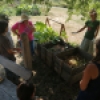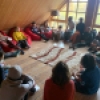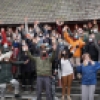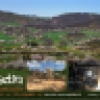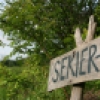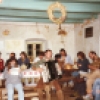Ako sme sa boli vzdelávať v ekokomunite vo Švédsku
V apríli 2021 sa zúčastnil zástupca ekokomunity Sekier projektu "Networking for Sustainability and a Green Youth" v rámci programu ERASMUS+.
Správa z eventu:>>>
Article by Tatjana Lavrova
Choosing the future with Erasmus+
If you are interested in finding out how to get Erasmus+ support for your projects in the
European Union, how to find partners abroad, how to organize events in the covid-19 era
and how to restore connection within yourself and to the world around you in nature, then
this text is for you.
Participants of the project ”Networking for Sustainability and a Green Youth” are completing and
submitting their first international youth projects aimed at sustainable development within the
framework of the new 2021-2027 Erasmus+ program. The training itself took place at the
Ängsbacka Course and Festival Centre in southern Sweden from April 7 to 12 with the financial
support of the European Union Erasmus+ program. The training was attended by 35 people from
10 EU countries.
The training in which I took part was organized for representatives of eco-movements, eco-
communities, eco-centers and youth organizations that work for a healthy environment, support
various methods of sustainable development, study and teach the skills of regenerative agriculture,
or in other words, permaculture (this is a generalized a term for sustainable farming practices that
mainly involve building soil, retaining water, and combining many different types of trees on the
same land).
I will tell you more about the participants later, but the training was coordinated in cooperation
with Global Ecovillage Network (GEN) Europe, whose members share ideas and information,
transfer technology and develop cultural and educational exchanges. Their website (www.gen-
europe.org/) is a useful resource for those interested in developing resource-saving technologies,
finding like-minded people, volunteering on an eco-farm, becoming a participant in eco-training,
etc. Thus many of the training participants were members of this network.
What is Erasmus+ ?
Erasmus+ is the educational, training, youth and sports program of the European Union. The
current program budget for 2021-2027 is 26.2 billion euros, which is almost double the previous
period, which lasted from 2014 to 2020.
In the current period, the Erasmus+ program pays great attention to social inclusion, a turn toward
green and digital technologies, as well as the participation of young people in promoting
democratic values. Erasmus+ supports the priorities and activities defined in the European
education area, the digital learning program and the European Skills Development Program.
Erasmus+ offers opportunities for mobility and cooperation in the field of preschool, school, higher
and vocational education, training, adult education, youth and sports. The activities described in
the projects can be aimed at both young people and specialists working with young people. The
program is administered by the European Commission and the Executive Agency for Audiovisual
and Cultural Affairs (EACEA) and has a representative office in each EU country. Outside the
European Union, government agencies represent the program in the education sector. The
European Commission allocates funds to local agencies, and they spend it based on local targeted
needs. Agencies also offer assistance to grant applicants from the time of submission of a project
application to the end of the project term and work closely with other organizations.
Training in the midst of covid-19
Despite the coronavirus crisis, life goes on, people meet, projects are written. Organizing a face-
to-face meeting of 35 people from ten countries, even in the midst of restrictions, is a quite feasible
task. Our hosts, the Ängsbacka Education and Festival Center, offered hospitality to guests from
Bulgaria, Germany, Holland, Greece, Italy, Spain, Slovakia, France, Sweden and Estonia for five
days. This is how they provided security for us.
Before entering Sweden, the participants had to pass a test for covid-19. In Sweden itself,
masks, social distancing and the use of an antiseptic are advisory in nature. The host country made
sure that all public areas have appropriate social distance markings on the floor and that
disinfectants and masks are prominently displayed. At the very first meeting, the training
participants agreed on additional security measures - volunteer duty officers were selected who
aired the common room every 45 minutes. In addition, everyone gave their word of honor that in
case of illness they would immediately inform the organizers about it and go to quarantine in a
solitary room.
We were also divided into groups, and each took patronage of order in any one zone - this
was called working meditation, something like meditation through useful work. For example, I
helped disinfect door handles in the area where the participants lived and in the common areas.
Before leaving, a mass testing of the participants was organized at the training site, which saved
both time and money.
Practical benefits
All participants in the training contribute in varied ways to environmental protection. Some were
ecocenter founders, some lived on eco-farms, some moved out of town to eco-communes or
ecovillages; some, living outside the city, work in previously acquired specialties online or in some
other way, some have mastered or are mastering new professions and areas related to sustainable
agriculture (permaculture), some, like me, live in the city, but work in the field of nature
conservation. The training participants are united by concern for the future, the desire for harmony
with nature and the desire to pass on their knowledge to others. Today, as they can and know how,
they lay and strengthen the foundation of sustainable development in their own fields.
Technologies can serve humanity and nature and we all need to apply them more wisely for a
better world.
The training helped us not only to write youth projects within the framework of Erasmus+,
but also to start discussing their ideas and find partners from among the representatives of various
organizations present.
It is important to say that the Erasmus+ program, among other things, actively supports the
involvement of people with fewer opportunities in projects. These can be both people with
disabilities and, for example, representatives of vulnerable social groups.
Of course, participation in international exchange projects is useful not only for people with
fewer opportunities, but for the widest range of people. New acquaintances, a new environment,
like-minded people, the opportunity to spend a lot of time in nature, studying its structure and
applying knowledge in practice inspires and energizes for months ahead. There is a synergy effect
when 1 + 1 = 3. As they say, it's better to see it once than to hear about it a hundred times. The
doors are open to everyone.
If you are looking for partners...
GEN Europe - European network for ecovillages (https://gen-europe.org/about-gen-
europe/who-we-are/)
Bulgaria (Green School Village https://greenschoolvillage.org/)
Estonia (Step-programme www.step.ee, Small Footprint https://vaikejalajalg.ee/en,
Pahkla Camphill Community https://pahklack.org/home/)
France (Grain & sense https://www.grainandsens.com, The EcoFairly association,
https://ecofairly.org/)
Germany (Eco-village Sieben Linden https://siebenlinden.org/de/start/, Community
ZEGG https://www.zegg.de/en/)
Greece (The Hives project https://www.hivesproject.eu, Cob www.cob.gr)
Netherlands (The Dutch Eco-Settlement Network GEN-NL
www.ecodorpennetwerk.nl.)
Italy (Borgo Basino www.borgobasino.org, Giardino della Gioia
www.giardinodellagioia.it/en/home-en/, Associazione Kora https://associazionekora.it/)
Slovakia (Zajezova, https://zajezka.sk/en/onas)
Spain (Molino de Guadamalsí https://www.molinodeguadalmesi.com/, eco-village
Valdepielagos https://numundo.org/center/spain/ecoaldea-de-valdepielagos, Iberian
Ecovillage Network RIE ecoaldeas.org)
Sweden (Charlottendal’s farm http://charlottendal.se/, Ängsbacka
https://www.angsbacka.com/about-angsbacka/)


